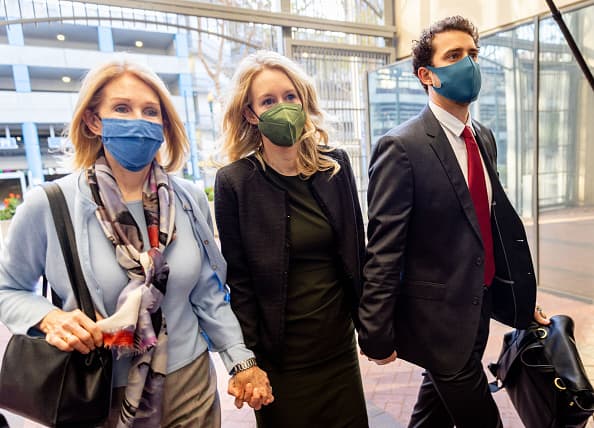Products You May Like
SAN JOSE, CALIF. — In a stunning admission, Elizabeth Holmes acknowledged that she was the one who put the logos of giant drug makers on Theranos lab reports but insisted she didn’t mean to deceive investors or business partners.
“I wish I had done it differently,” Holmes, dressed in a dark green dress and black blazer, told the jury from the witness stand. On her third day testifying, Holmes directly responded to key allegations of the government’s case against her.
Federal prosecutors claim Holmes deceived investors, in part, by using unauthorized due diligence reports from Pfizer and Schering-Plough, whose company logos were on the documents. Jurors have repeatedly been shown the Theranos reports that Holmes sent to Walgreens executives with the logos on it. Witnesses from the pharmaceutical companies testified that they never authorized the use of the logos.
Holmes said she was the one who added the logos to the reports “because this work was done in partnership with those companies and I was trying to convey that,” she said. But Holmes claimed it wasn’t meant to falsely convey that the companies produced the lab reports.
“Did you intend to give that impression?” Kevin Downey, an attorney for Holmes, asked.
“No, but I’ve heard that testimony in this case and I wish I had done it differently,” Holmes said.
“Did you try to conceal from Pfizer that you had added Pfizer’s logo to the top of the report that you sent to Walgreens in 2010?” Downey asked.
“Not at all,” Holmes said.
Holmes said an early goal for Theranos was to partner with retail giants, she said she reached out to “all of them” including Target, CVS, Walmart, Walgreens and Safeway.
Walgreens became a key partner for Theranos, rolling out wellness centers inside 40 of its stores in Arizona. However Walgreens terminated its partnership with the start-up in 2016 and sued the company for breach of contract.
For the first time on the stand, the jury heard Holmes mention the name of her top executive and for a time romantic partner, Ramesh “Sunny” Balwani. Holmes testified that Balwani, along with some lawyers, were involved in negotiations with Walgreens.
In an attempt to refute another key charge, Holmes spoke about using third-party devices to test patient blood. She testified Theranos turned to modified devices as a workaround because there were too many samples for their lab to handle.
Furthermore, Holmes told the jury that Theranos didn’t disclose this information to investors or business partners because she believed it was intellectual information.
“This was an invention we understood from our counsel we had to protect as a trade secret and if we disclosed that trade secret,” Holmes said. “The advice was to keep it confidential so Theranos would have the chance to profit off of that invention.”
Holmes acknowledged that she was fully aware of the challenges inside the lab.
“It’s numbers, there’s always challenges,” Holmes told the jury. “We were constantly working to make sure we had the right components in the device to handle all of the tests that were ultimately going to be the test list for retail.”
Holmes also spoke about her information she shared with her board of directors, including former Secretary of Defense James Mattis, former Secretary of State Henry Kissinger, former Wells Fargo CEO Richard Kovacevich and Senator Sam Nunn.
Downey asked Holmes to walk the jury through an October 2013 meeting.
“I recall talking to board members and asking for advice on how we set up this business to be successful in long term,” Holmes said. “What I should be focused on internally in order to do so.”
Holmes said her board members were paid $150,000 a year in addition to receiving 500,000 shares in Theranos. Henry Kissinger was paid another $500,000 in consulting fees, according to Holmes.
“We were sharing with the board that we had these trade secret inventions that we thought was a big deal and we needed to protect,” Holmes said, adding she recalled “discussing with the board whether this invention should in fact be treated as a trade secret.”
Holmes was met a sea of camera crews when she arrived at the courthouse on Tuesday, and a spectator repeatedly yelled out “God bless you, girl boss” as she walked inside.
Early in the morning, as reporters and members of the public began lining up outside Robert F. Peckham Federal Building one spectator arrived with a suitcase full of blonde wigs, black turtlenecks, red lipstick and “blood energy drink.”
Artist Danielle Baskin was selling the Holmes costumes before security informed her she cannot sell merchandise on federal property. Baskin said she isn’t a Holmes supporter but wanted to come to the trial and “see what it would be like experiencing her energy.”
